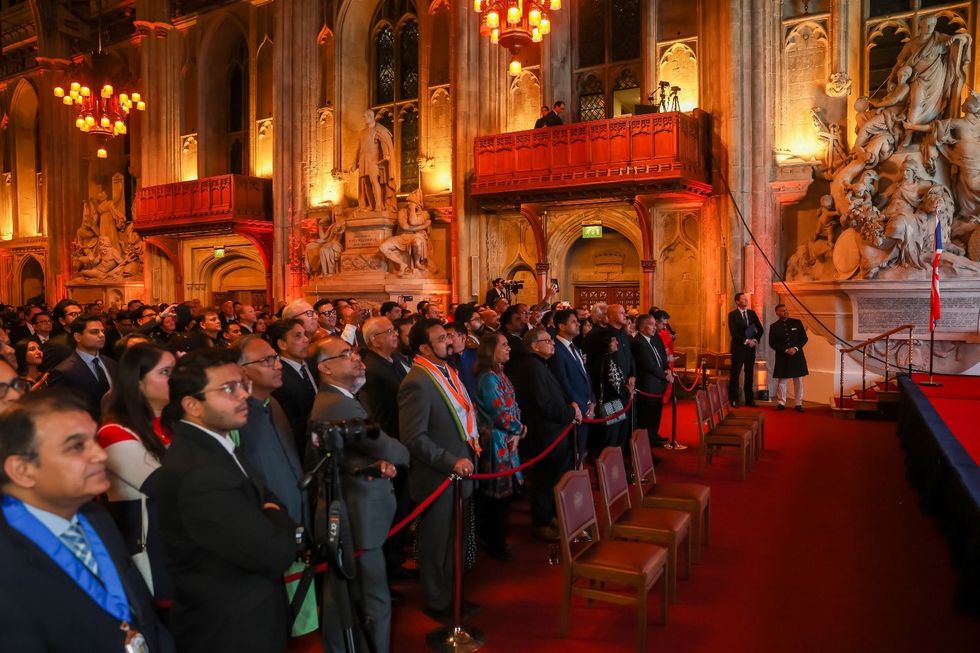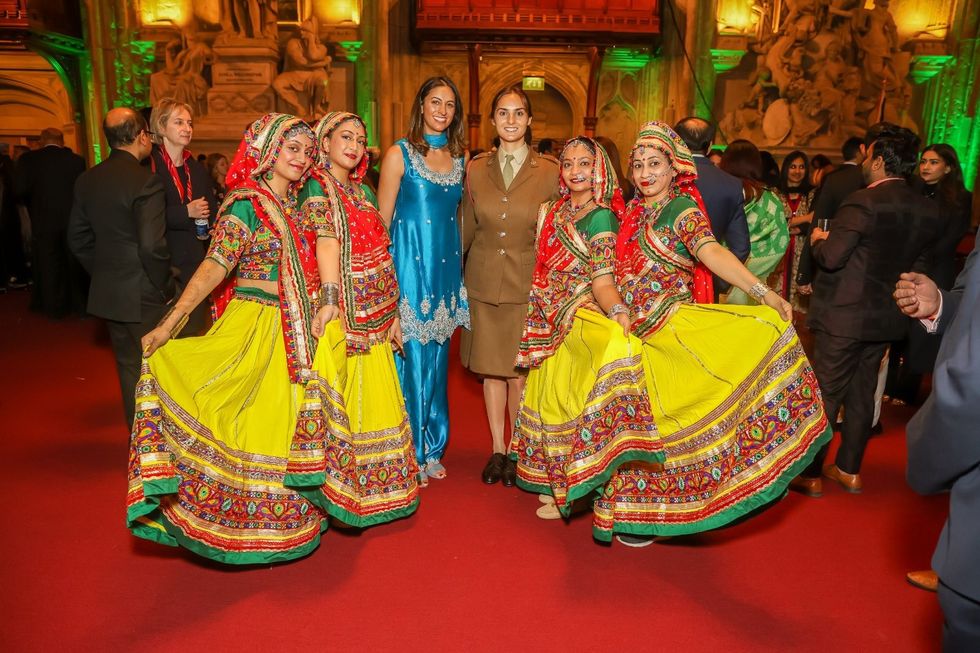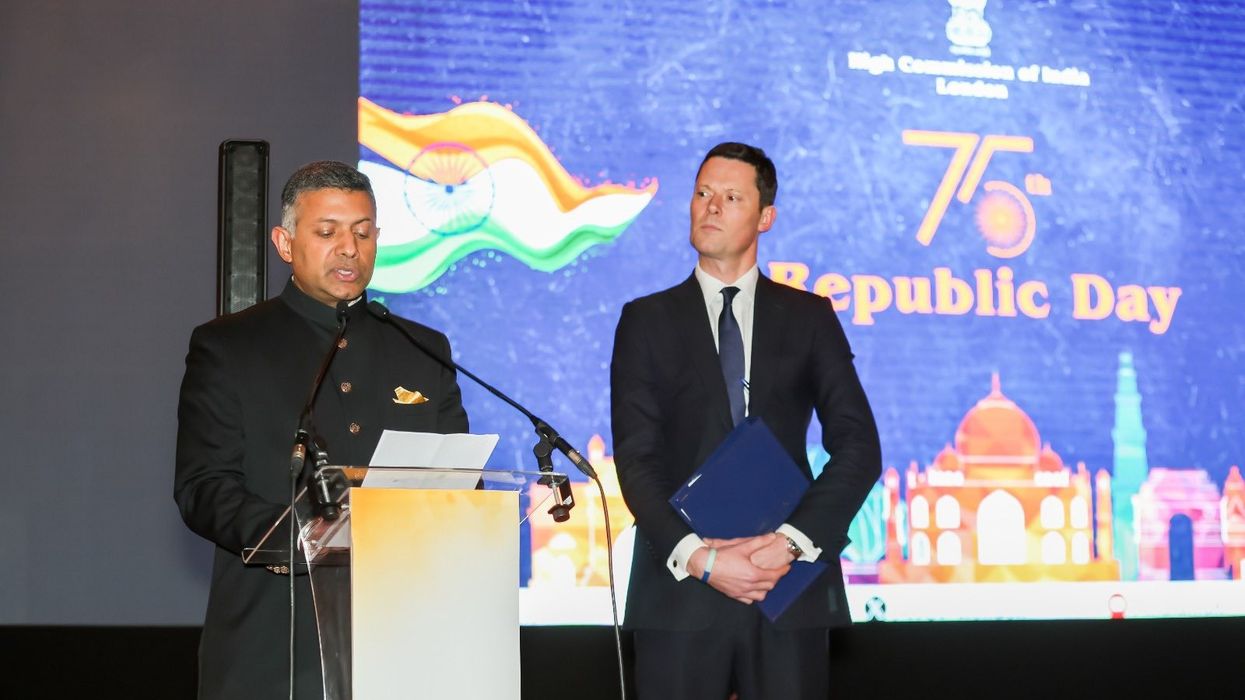THE UK and Indian governments are striving to establish a modern relationship, Alex Chalk, the lord chancellor and justice secretary, said last Friday (26).
He was speaking at the Guildhall in the City of London where the Indian High Commissioner, Vikram Doraiswami, hosted a reception to mark the 75th anniversary of the country’s Republic Day on January 26, 1950.
Although India became independent on August 15, 1947, Republic Day confirmed the country’s formal break with the British Crown.
Doraiswami paid tribute to the 2.5 million people of Indian origin in the UK who were well represented at the Guildhall: “Our interests are driven by the enormous contribution of British people of Indian origin.”
He added they had “contributed greatly to UK economic and cultural perspective, in business, finance, healthcare, media and sport”.
The high commissioner summed up: “Our relationship to the UK is being driven in new directions. We see a new futuristic partnership that is respectful of the past, the journey we have travelled together, but inspired instead by the road ahead. And, then on that journey, we hope you will create a new partnership.”
Chalk, a barrister and KC, came into the Commons in 2015 as the Tory MP for Cheltenham. At 47, he is only four years older than prime minister Rishi Sunak, who also entered the Commons in 2015, as William Hague’s successor in Richmond in Yorkshire.
Chalk included a personal touch by revealing he had once taught in India as a young man.
He began: “I would like to think of myself as a warm friend of the great country of India. Having spent a formative part of my life in Uttar Pradesh, I was delighted to go back to that beautiful state last February to speak at a global investment summit alongside chief minister Yogi Adityanath. And it brought back so many memories of my experiences working as a teacher there 25 years ago, which continues to influence me even today.

“But what stays with me principally is the warmth, the generosity and the sheer energy of the people I met and spent time with in India.”
The justice secretary spoke of the Republic Day celebrations, now and in 1950 when India gave to itself a constitution: “What a delight it was to see just now the celebrations of the parade in New Delhi, starting at the Rashtrapati Bhavan and looping its way to India Gate, and then marching on to the Red Fort.
“The first celebrations almost three quarters of a century ago were attended by the architects of independent India, a young country with ancient roots, but endless possibilities. They could see then what India was capable of – which you are now showing the world, not only as an economic powerhouse, but as one of the very few spacefaring nations. India’s potential really is out of this world.”
He added: “Republic Day is a moment to recognise those who contributed and continue to contribute to those triumphs. It’s a moment to celebrate the rich cultural heritage and diversity that makes India greater than the sum of its parts.
“But perhaps most importantly, it is a moment to celebrate the principles that underpin your success – sovereignty, justice, liberty, democracy, as set out in your constitution, which came into effect on this day 74 years ago. I’m reliably informed that it is the most expansive written national constitution in the world, and that’s somehow feels fitting to the world’s largest democracy.”
He spoke of the UK-India collaboration in the legal sector, which the British have been long been pressing for.
Chal said, “A few months ago, I had the opportunity to address the Bar Council of India conference in Delhi. There I spoke about those things that bind our two nations together – the living bridge between us as our prime ministers have called it. It was an honour to meet distinguished attendees, including the honourable prime minister Modi, the minister for law and justice, and the chief justice of India.

“I welcome the growing legal links between our two nations. Thousands of Indian lawyers already make an enormous contribution to the UK’s legal sector. Ours is the second largest legal sector in the world. Indian lawyers are making a vital contribution. They are part and parcel of our success, and I look forward to strengthening those links in future, working together, as India forges a global outward facing legal services sector.”
He also paid tribute to the Indian diaspora in the UK, which he said “makes the UK the country it is today and underpins that close cooperation from work to deliver a Covid-19 vaccine to the landmark agreement signed last year to enable quicker, deeper collaboration on science.
“And our relationship grows ever stronger under the UK-India 2030 roadmap with negotiations for a free trade agreement that will, I hope, soon create even more new exciting trade and investment opportunities for the United Kingdom and India.
“We have growing partnerships in renewables, green hydrogen, as well as a new UK-India pensions and insurance partnership. That’s before one goes on to consider the military relationship as well.”
He received a rousing cheer when he ended with a quotation from Romand Rolland, the French dramatist, novelist, essayist, art historian and mystic who was awarded the Nobel Prize for Literature in 1915 “as a tribute to the lofty idealism of his literary production and to the sympathy and love of truth with which he has described different types of human beings”.
Chalk recalled the words of the French seer: “If there is one place on the face of the earth where all the dreams of living men have found a home from the very earliest days when man began the dream of existence, it is India.”
The lord chancellor was preceded by the high commissioner who pointed out the progress India had made since 1950. The country was born in hope.
“On this day in 1950, India stood as a newly free modern nation on the cusp of becoming a republic. Its people watched with great anticipation, as the world’s largest democracy took shape, as a detailed set of lofty commitments were made to ourselves to give every single Indian citizen rights and obligations, laws and regulations, conditions to prosper and indeed, to seek and enforce accountability in governance.”
But many outside India were prepared to write off India. The country was in shock after Partition.
Some 90 per cent of its 340 million people were “heartbreakingly poor”. And 88 per cent expected to live for only 42 years. Since then, the country had recorded “phenomenal achievement”.
“Look at what has been done these past 75 years, and compare India’s rate of transformation of polity, society, economy and indeed governance with any other country in the world – and I venture to suggest we don’t come out at all badly,” said Doraiswami.
“And remember all of this has been achieved through an evolving social and uncompromising democratic framework,” he added.
“All this is relevant for us today. Not just from a vague sense of goodwill about some country distant from these shores. But because in this increasingly troubled era of geopolitical competition in which we live, the best guarantor of growth and security is partnership based on values and interests.
“And the India-UK partnership is exactly that. Ours is a partnership built on our sometimes complex historical foundation. But this is fortified by the values of democracy and fairness, and consolidated by the increasing mutuality of our interests.”
The high commissioner did not forget to send his good wishes to “the health and happiness of His Majesty the King,” who left the London Clinic on Monday (29) three days after being operated on for an enlarged prostate by Ranan Dasgupta, who is the royal household’s Serjeant-Surgeon.




